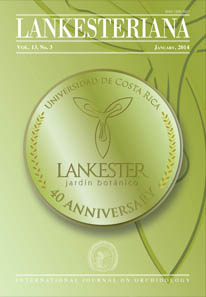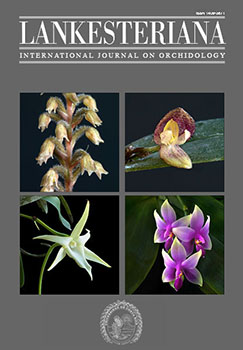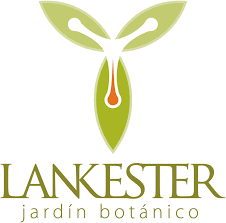Nocturnal pollinatIon by Fungus gnats of the colombian endemic species, Pleurothallis marthae (orchidaceae: pleurothallidinae)
DOI:
https://doi.org/10.15517/lank.v13i3.14429Keywords:
bradysia, orchid pollination, fungus gnats, pollinators, mycetophila, olfactory mimicryAbstract
Contemporary patterns of plant biodiversity result from the ecological and evolutionary processes generated by species interactions. Understanding these interactions is key for effective biodiversity conservation at the species and the ecosystem level. Orchid species often have highly specialised pollinator interactions, and the preservation of these is critical for in situ orchid conservation. The majority of orchid species occur in tropical regions, and information regarding their interactions is limited. We present data on pollinator identities, pollination mechanisms and flowering phenology of the Colombian endemic orchid, Pleurothallis marthae. We evaluated the mechanisms of attraction, the presence of osmophores, and the reproductive system of the species. Pleurothallis marthae is self-compatible with nocturnal anthesis pollinated by Mycetophila sp. (Mycetophilidae), probably attracted by a string fungus like smell liberated by the flower and Bradysia sp. (Sciaridae) that feed on nectar in the labellum. Osmophores and nectaries were detected in the epidermis of the sepals and petals. We present new evidence that the genus Pleurothallis is adapted to Diptera pollination. Our study indicates that the pollination mechanism of P. marthae is based on the nocturnal attraction of two species of fungus gnats, probably combining food attraction and brood place deceptionDownloads
Download data is not yet available.
Downloads
How to Cite
Duque Buitrago, C. A., Alzate Quintero, N. F., & Tupac Otero, J. (2014). Nocturnal pollinatIon by Fungus gnats of the colombian endemic species, Pleurothallis marthae (orchidaceae: pleurothallidinae). Lankesteriana: International Journal on Orchidology, 13(3). https://doi.org/10.15517/lank.v13i3.14429
Issue
Section
Articles
License
According to the Open Access policy promoted by the University of Costa Rica, all the papers published by Lankesteriana are licensed under the Creative Commons copyright and can be downloaded free of charge. The journal holds copyright and publishing rights under the CC BY-NC-ND 3.0 CR license.
Before the publication of the materials submitted by the author(s) in LANKESTERIANA, the author(s) hereby assign all rights in the article to the Lankester Botanical Garden.





